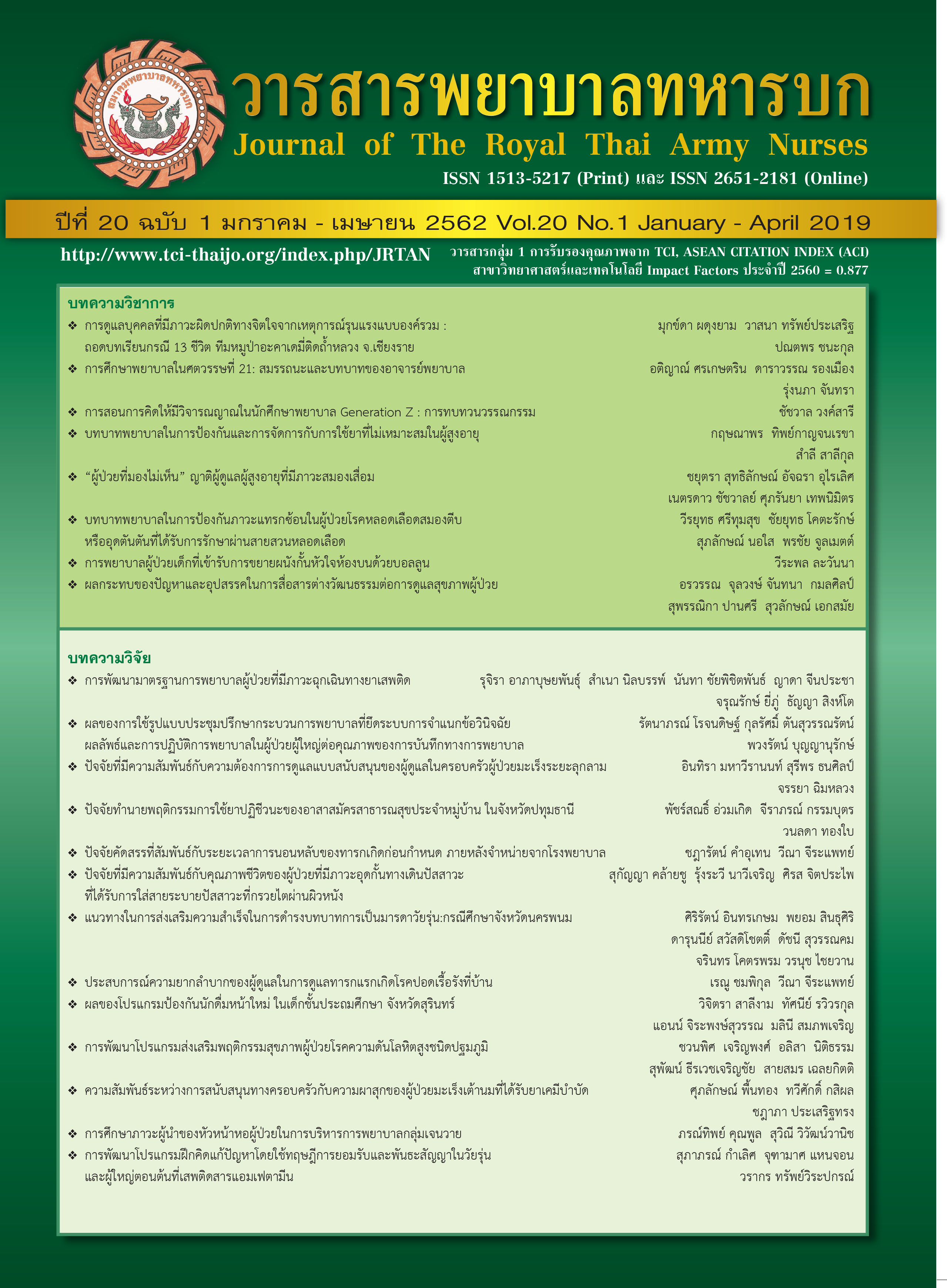Nursing Education in the 21st Century: Competencies and Roles of Nursing Instructors
Keywords:
Nursing Education in the 21st century, Competencies, Nursing InstructorsAbstract
The purpose of this article is to present the concept of nursing education in 21st century skills of nursing students, competencies and roles of Nursing Instructors. The changing in the 21st century, health care service system and implementing of transformative learning in education require the change in nursing education of the 21st century. Nursing instructors are individuals who have a role in promoting instructional reform to keep up with the changes and having a crucial role in develop the competencies of nursing students by the professional standards established by the Nursing Council as well as the developing of 21st century skills. Therefore, in promoting effective nursing education management for the 21st century, nursing instructors need to be competent and ability to perform their role in various areas as follows: 1) theories and principle of adult learning, 2) curriculum development and implementation, 3) nursing practice, 4) research and evidence, 5) communication, collaboration and partnership, 6) ethical/legal principles and professionalism, 7) monitoring and evaluation, and 8) management, leadership and advocacy.
Downloads
References
2. Panich V. Transformative learning. Bangkok: S. R. Printring Massproduct Co, Ltd.; 2015. (in Thai)
3. Sethasathien S. A model of interprofessional education (IPE) in department of physical medicine and rehabilitation, Udonthani Hospital. J Thai Rehabil Med. 2015; 25(2):65-70. (in Thai)
4. The Higher Education Commission. Guidelines for promoting the quality of teaching and learning management of instructors in higher education institutions. Bangkok: Pappim; 2018. (in Thai)
5. Rujkorakarn D. Summary report of the educational management in nursing for the 21st century conference. 12 - 13 February 2014, Boromarajonani College of Nursing, Saraburi; 2014. (in Thai)
6. Kamanee T. Science of teaching knowledge for effective learning management. 17th ed. Bangkok: Chulalongkorn University Press;2013. (in Thai)
7. Kunlaka S, Chantra R, Sornkasatrin A, Kansukcharean A. A synthesis of research on nursing instruction. . Nursing Journal of the Ministry of Public Health. 2016; 26(1): 93-106. (in Thai)
8. Watanapa P. Health education for the 21st century: From concept to practice. Handout for the conference on Dean and Director of nursing institute “Nursing education management for the 21st century”, 13 February 2014, Amari Don Muang Airport Bangkok; 2014. (in Thai)
9. Turner K, Leungratanamart L, Niranrat S, Jarnarerux J, Wattanakull B, Reunreang T. Twenty first century skills of nursing students of Boromarajonani College of Nursing, Chonburi. Nursing Journal of the Ministry of Public Health.2015; 25(2): 178-93. (in Thai)
10. Chantra R, Sarakshetrin A. Learning skills in 21st century of nursing students at Boromarajonani College of Nursing, Suratthani. The Southern College Network Journal of Nursing and Public Health. 2017; 4(1):180-90. (in Thai)
11. Mishra P, Kereliik K. What 21st Century Learning? A Review and a Synthesis 2012. 2015. [cited 2018 May 9].
12. Bellanca J, Brandt R, editors. 21st Century Skills: Rethinking How Students Learn. Bloomington: Solution Tree Press. 2010.
13. Srimongkon S. Promoting 21st century skills: Communication and collaboration skill in the science classroom on cell and its component by simulation techniques. Master of Education in Curriculum and Instruction Graduate School Khon Kaen University.; 2014. (in Thai)
14. Panich V. Enjoy learning in 21st century. Bangkok: Sodsri-Saridwongso Foundation; 2013. (in Thai)
15. Panich V. 21st century learning path for disciples.Bangkok: Sodsri-Saridwongso Foundation;2012. (in Thai)
16. Kunaviktikul W. Teaching and learning in the discipline of nursing in the 21stcentury. Nursing Journal. 2015; 42(2), 152-56. (in Thai)
17. Turner K, Petkong J, Howharn C, Mamark N. Teach less, learn more: A conceptual model and application for nursing education. Nursing Journal of the Ministry of Public Health. 2016;26(3), 13-26. (in Thai)
18. National League for Nursing. The scope of practice for academic nurse educators. New York, NY:Author; 2005.
19. Trilling B, Fadel C. Learning and innovation skills. 21st century skills learning for life in our times. San Francisco: Jossey-Bass; 2009.
20. World Health Organization. Nurse educator core competencies. Geneva: The WHO Document Production Services; 2016
21. Prajankett O. Transformative learning: Nursing education perspective. Journal of The Royal Thai Army Nurses. 2014; 15(3), 179-184.(in Thai)
22. Thongphet P, Samphawamana O. Components and indicators of nurse instructors competencies in 21st century, nursing colleges under Praboramarajchanok Institute the Ministry of Public Health. Research report Boromarajonani College of Nursing Suratthani; 2016. (in Thai)
23. Siritarungsri B. Leadership for nurses in ASEAN community. Nonthaburi: Sukhothaithammathirat University Press; 2016. (in Thai)
24. Prajankett O. An educational innovative organization: A new choice of educational administration. Journal of The Royal Thai Army Nurses. 2014; 15(1), 45-51. (in Thai)
Downloads
Published
How to Cite
Issue
Section
License
บทความหรือข้อคิดเห็นใดใดที่ปรากฏในวารสารพยาบาลทหารบกเป็นวรรณกรรมของผู้เขียน ซึ่งบรรณาธิการหรือสมาคมพยาบาลทหารบก ไม่จำเป็นต้องเห็นด้วย
บทความที่ได้รับการตีพิมพ์เป็นลิขสิทธิ์ของวารสารพยาบาลทหารบก
The ideas and opinions expressed in the Journal of The Royal Thai Army Nurses are those of the authors and not necessarily those
of the editor or Royal Thai Army Nurses Association.






